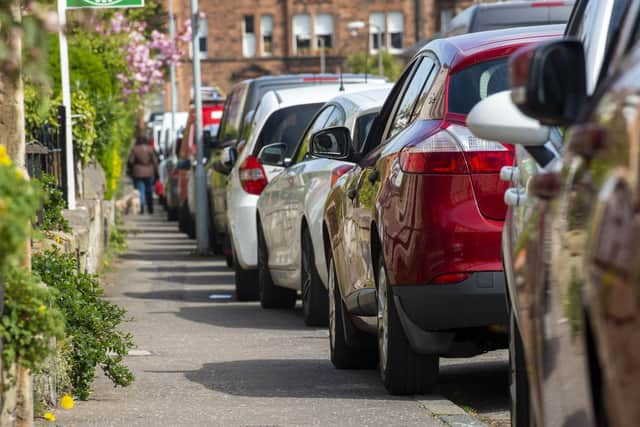Edinburgh parking: Tough new ban on pavement parking will come into force in January backed by £100 fines
and live on Freeview channel 276
A tough new ban on pavement parking across the Capital is to be introduced in the new year.
In January, Edinburgh will become the first place in Scotland to use new Scottish Government legislation to bring in a complete ban on the behaviour, and drivers who park on pavements, at dropped kerbs or double park will face fines of £100. Transport and environment convener Scott Arthur said there were no plans for exemptions beyond the national ones laid down, such as emergency vehicles.
Advertisement
Hide AdAdvertisement
Hide AdHe said pavement parking could cause inconvenience to all road users, but was a particular problem for people with mobility issues, parents with pushchairs and older people. “I think the ban is long overdue. Because of the way the legislation works just now the police aren’t really able to deal with it, but now the council has the power to take it on and I think it will be transformative.”


He said the ban on A-board advertising had made a big difference in some of the city’s busy shopping streets in places like Morningside, Bruntsfield and Stockbridge. “But the benefit of the pavement parking ban will be felt right across the city.” He said a consultation survey had found 68 per cent of people backed a ban on pavement parking.
Officials surveyed Edinburgh’s 5,217 streets and identified 590 mostly residential streets where pavement parking was causing a significant issue. The council hopes an awareness campaign, currently being designed by Transport Scotland, will help change behaviour over the festive period before the ban comes into effect. And a further council-run campaign is planned once the ban is introduced.
Councillor Arthur said: “Implementing these new parking restrictions is part of our commitment to ensure Edinburgh’s roads and pavements are accessible for all. Making sure our footways are kept clear will deliver real benefits for pedestrians and road users, particularly those who are disproportionately affected such as parents with pushchairs, older people and wheelchair users.
Advertisement
Hide AdAdvertisement
Hide Ad“We would expect everyone to adhere to the new prohibitions when the final regulations come into force to guarantee our streets are safer and more user-friendly.”
He said the legislation allowed emergency vehicles to park on the pavement and where there is no alternative, delivery drivers can also still park on the pavement, so long as there is still 1.5 metres for pedestrians to pass. Councils have the discretion to grant other exemptions. But Cllr Arthur said: “We don’t plan on having any additional exemptions.”
The tough approach on the issue is supported by organisations representing interested groups, such as partially-sighted people and pedestrians.
Niall Foley, lead external affairs manager at Guide Dogs, said: “Parking on pavements is a nuisance for everyone, but potentially dangerous if you are a wheelchair user forced onto the road, pushing a buggy, or have sight loss and can’t see traffic coming towards you. When cars block the way, it undermines the confidence of people with a vision impairment to get out and about independently.
Advertisement
Hide AdAdvertisement
Hide Ad“We welcome the parking measures being introduced and look forward to working with the council to ensure the pavement parking prohibitions are a success.”
Stuart Hay, director of Living Streets Scotland, said: “Edinburgh is taking the right approach to the enforcement of pavement parking, recognising that footways are for people, not parking spaces for cars. Exemptions should only be applied in exceptional cases based on evidence, which can only be collected via careful monitoring and consultation. This is the best way to ensure those most affected by blocked pavements, including disabled people, have safe access to our streets.”